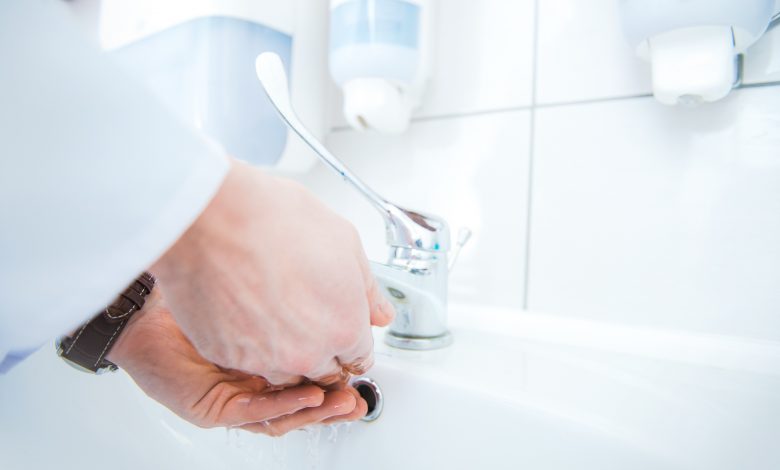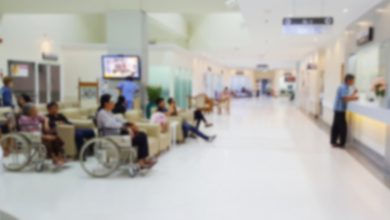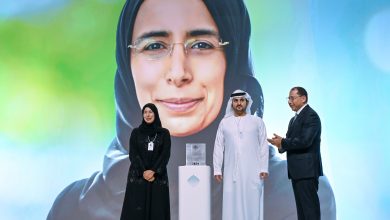
Washing hands with soap and water more effective than sanitisers: QEERI experts
خبراء في معهد قطر: غسل اليدين بالصابون والماء أكثر فعالية من المطهرات
The Peninsula
Doha: Experts from Qatar Environment and Energy Research Institute, a national research institute under Hamad Bin Khalifa University, say that washing hands with soap and water is more effective than using hand sanitiser in fight against COVID-19.
They say that the virus can also be passed on by touching contaminated surfaces and then touching your face, even when outside. “Ordinary soap diluted in water is sufficient to rupture and kill many different types of bacteria and viruses, including COVID-19. It is generally accepted to be more effective than using hand sanitizer; however, high alcohol content sanitiser should be considered where soap and water is not available,” said Dr. Oluwaseun Ogunbiyi from Qatar Environment and Energy Research Institute
According to Dr. Oluwaseun, hand-washing with soap, when done correctly, is critical in the fight against the coronavirus; however, according to Unicef, there are millions of people worldwide who do not have ready access. In total, only three out of five people worldwide have basic handwashing facilities, which increases the risk of contracting the virus.
Dr. Deema Al Masri, from Qatar Environment and Energy Research Institute, said that COVID-19 can not contaminate drinking water or tap water.
“To date, COVID-19 has not been detected in drinking water supplies globally. Municipal drinking water systems utilise filtration and chlorination steps that are generally thought to be effective in activating COVID-19,” said Dr. Deema “COVID-19 is also unlikely to be found in bottled water itself. However, given the suspected life-span of COVID-19 on plastic, when buying bottled water from a supermarket or water delivery, care should be taken with handling of the packaging.”
Dr. Deema added that the COVID-19 virus is an enveloped virus, with a fragile outer membrane. Generally, enveloped viruses are less stable in the environment and are more susceptible to oxidants, such as chlorine. While there is no evidence to date about survival of the COVID-19 virus in water or sewage, the virus is likely to become inactivated faster than non-enveloped human enteric viruses with known waterborne transmission.
According to the World Health Organization (WHO), there is no evidence that COVID-19 is transmitted in wastewater treatment systems or in treated wastewater. Wastewater treatment plants treat viruses and other bacteria. WHO recommends the use of standard, well-maintained plumbing, such as sealed bathroom drains, and backflow valves on sprayers and faucets to prevent aerosolized fecal matter from entering the plumbing or ventilation system, together with standard wastewater treatment.
Dr. Jenny Lawler, Qatar Environment and Energy Research Institute, said, “The virus is contracted when someone comes in direct contact with respiratory droplets of an infected person, usually through coughing and sneezing. The virus can also be passed on by touching contaminated surfaces and then touching your face, even when outside,” said Dr. Jenny.
“The coronavirus may survive on surfaces anywhere from several hours up to two to three days, with the most recent study indicating that the virus can be found after up to four hours on copper, up to 24 hours on cardboard and up to two to three days on plastic and stainless steel,” said Dr. Jenny.
The measures against COVID-19 include washing hands thoroughly, ensuring that surfaces are properly cleaned and ensuring that a person covers his mouth and nose with flexed elbow or tissue when coughing or sneezing.
Other measures include disposing of any used tissues immediately and effectively, staying at home and practicing social distancing, self-isolating if unwell and monitoring that ablution areas make soap and hand sanitizers readily available to ensure visitors comply with hygiene practices.
الدوحة – الشرق
أكدوا على اتباع العادات الصحية الملائمة خلال فترة انتشار الوباء
قدم خبراء في معهد قطر لبحوث البيئة والطاقة، التابع لجامعة حمد بن خليفة نصائح للوقاية من فيروس كورونا، ركزت على ما يمكن القيام به لتقليل خطر الإصابة، وأهمية اتباع العادات الصحية الملائمة خلال فترة انتشار الوباء.
وحول أهمية غسل اليدين بالماء والصابون قال الدكتور أولواسيون أوجونبي: الصابون العادي المخفف بالماء كافٍ لقتل والقضاء على العديد من الأنواع المختلفة للبكتيريا والفيروسات، بما في ذلك فيروس كورونا. وهو مقبول عمومًا باعتباره شكلًا أكثر فعالية من استخدام معقم اليدين، ولكن يجب التفكير في استخدام المعقمات التي تحتوي على كمية عالية من الكحول في حال عدم توافر المياه والصابون.
وأضاف: غسل اليدين بالصابون بطريقة صحيحة أمر حيوي لمكافحة فيروس كورونا، ولكن منظمة الأمم المتحدة للطفولة (اليونيسف) أكدت أن هناك الملايين من البشر في جميع أنحاء العالم لا يمتلكون إمكانية الوصول إلى وسائل النظافة الأساسية. وإجمالًا، يمتلك ثلاثة أفراد من أصل كل خمسة في جميع أنحاء العالم الوسائل الأساسية لغسل اليدين، وهو ما يزيد من خطر الإصابة بالفيروس.
بدورها قالت الدكتورة ديما المصري: حتى الآن، لم يُكتشف فيروس كورونا في إمدادات مياه الشرب على مستوى العالم. وتستخدم أنظمة مياه الشرب البلدية خطوات التصفية والكلورة التي يُعتقد عمومًا أنها فعالة في مكافحة فيروس كورونا.
ومن غير الوارد كذلك أن يتواجد الفيروس في المياه المعبأة. ولكن بالنظر إلى فترة الحياة المحتملة للفيروس على البلاستيك، يجب توخي الحظر عند شراء عبوات المياه من المحلات أو منافذ تسليم المياه وتداولها.
وبينت أن كورونا فيروس مغلف لديه غشاء خارجي ضعيف. وتتميز الفيروسات المغلفة عمومًا بأنها أقل استقرارًا في البيئة وأكثر عرضة للمؤكسدات مثل الكلور. ورغم عدم وجود دليل حتى الآن على بقاء فيروس كورونا في المياه أو مياه الصرف الصحي، من الوارد أن يصبح الفيروس خاملًا بشكل أسرع من الفيروسات المعوية البشرية غير المغلفة المعروفة بإمكانية انتقالها عن طريق المياه.
ووفقًا للبيانات الصادرة عن منظمة الصحة العالمية، لا يوجد دليل على أن فيروس كورونا ينتقل عبر أنظمة معالجة مياه الصرف الصحي أو في المياه المعالجة. وتعالج محطات معالجة مياه الصرف الصحي الفيروسات وأنواع البكتيريا الأخرى. وتوصي منظمة الصحة العالمية باستخدام أنظمة سباكة قياسية تحظى بصيانة جيدة، مثل مصارف الحمامات المغطاة، وصمامات التدفق العكسي على رشاشات المياه والصنابير لمنع المواد البرازية المتطايرة من الدخول إلى نظام السباكة أو التهوية، مع النظام القياسي لمعالجة مياه الصرف الصحي.
من جهته قال الدكتورة جيني لولر: ينتشر الفيروس عندما يتعرض أحد الأشخاص بشكلٍ مباشرٍ لرذاذ الإفرازات التنفسية لشخص مصاب بالفيروس، عادةً عن طريق السعال والعطس. ويمكن أن ينتقل كذلك عبر لمس الأسطح الملوثة ومن ثم لمس الوجه، حتى وإن كان الشخص في الخارج.
وقد يبقى فيروس كورونا على الأسطح في أي مكان لمدة تتراوح من عدة ساعات وحتى يومين أو ثلاثة أيام، حيث أشارت أحدث دراسة إلى أن الفيروس يمكن أن يتواجد على النحاس لفترة تصل إلى أربع ساعات، ولمدة قد تصل إلى 24 ساعة على الورق المقوى، وحتى يومين أو ثلاثة أيام على البلاستيك والفولاذ المقاوم للصدأ.
وبين أن هناك عدد من التدابير الوقائية التي يمكن تبنيها للحد من خطر الإصابة بالعدوى، وتشمل غسل اليدين بعناية بالماء والصابون. التأكد من تنظيف الأسطح وتعقيمها بعناية وانتظام. التأكد من تغطية الفم والأنف عند السعال أو العطس بمحارم ورقية أو بثني الذراع. التخلص من أي محارم ورقية مستعملة على الفور وبشكلٍ فعال. البقاء في المنزل وممارسة تدابير التباعد الاجتماعي. العزل الذاتي إذا ما شعر المرء بأنه ليس على ما يرام. والتأكد من توافر الصابون ومعقمات اليدين في مناطق غسل اليدين لضمان التزام الزوار بعادات النظافة والصحة.



